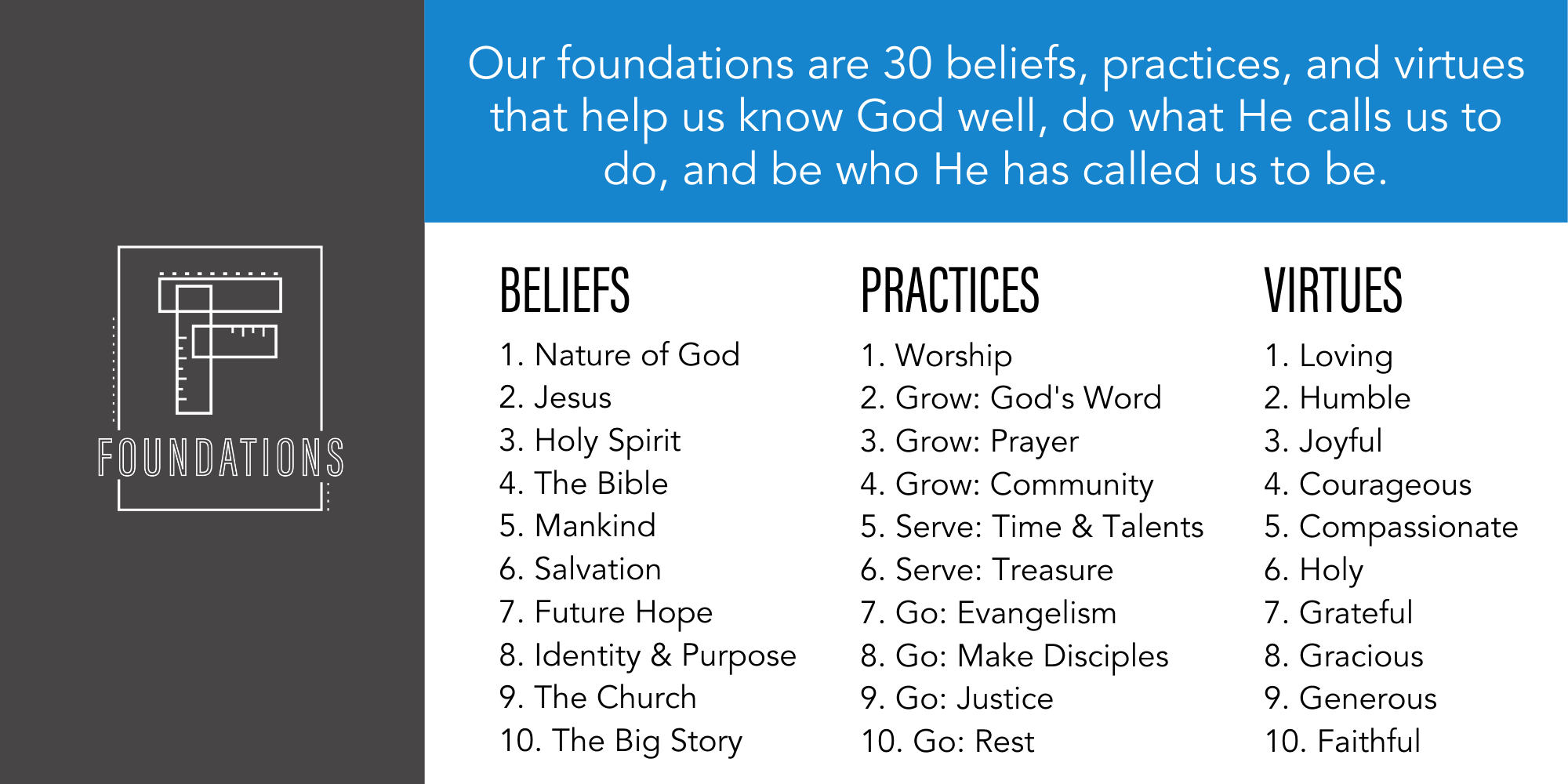Foundations Blog
We’re in a new series called “Foundations” which builds off of Jesus’ metaphor in Matt 7: “A house built on sand will never be able to stand BUT a house that’s built on the rock will never be able to fall.”

Practice #3 PRAYER - Day 1
This week, we’re in Practice #3: Grow in Prayer. If you can, give yourself 15 minutes to just be with God. Set a timer and put everything else away except for you, your Bible, and the device you’re reading this on.
Let’s read from the NET (New English Translation):
John 14:15-21
“If you love me, you will obey my commandments. Then I will ask the Father, and he will give you another Advocate to be with you forever— the Spirit of truth, whom the world cannot accept, because it does not see him or know him. But you know him, because he resides with you and will be in you. I will not abandon you as orphans, I will come to you. In a little while the world will not see me any longer, but you will see me; because I live, you will live too. You will know at that time that I am in my Father and you are in me and I am in you. The person who has my commandments and obeys them is the one who loves me. The one who loves me will be loved by my Father, and I will love him and will reveal myself to him.”
In this passage, Jesus is talking with his disciples in what is known as the Upper Room discourse. He is telling them what they need to know before His death on the cross. And it’s here in verses 15 to 21 that He unfolds some of the mystery of the Trinity - the foundational Christian belief that God is Three-in-One. Jesus tells his followers that He is “in [the] Father” who is going to send the “Spirit of truth” as a gift once Jesus has departed.
What Jesus is allaying is their fear that they’ll be left alone. No, says Jesus. You’ll have the Spirit, who is linked to me (Jesus), who is linked to the Father. Later church leaders would state it this way: the Father, Son, and Holy Spirit are the same in essence, though different in personhood (see the Nicene-Constantinopolitan Creed of 381).
Furthermore, Jesus is inviting them to consider the radical way in which the Triune God interacts with believers. Grab a highlighter or pen and circle each time the phrase “in you” or “with you” are used in these verses. What is Jesus teaching his disciples?
Sinclair Ferguson summarizes it like this: “Thus, to be united to Christ is to share in a union created by the indwelling of the Spirit of the incarnate Son who Himself is ‘in’ the Father as the Father is ‘in’ Him. Union with Christ means nothing less than fellowship with all three persons of the Trinity. It is not that the divine nature is infused into believers. Our union with Christ is spiritual and personal—effected by the indwelling of the Spirit of the Son of the Father.
Notice, then, the exquisite picture Jesus paints to express the beauty and intimacy of this union: it involves nothing less than the Father and the Son making their home in the heart of the believer (John 14:23). [excerpted from https://www.ligonier.org/learn/articles/union-with-god-the-trinity]
We are in God and He is in us! Thus, prayer (communication) is an intimate practice, not a formulaic one. It’s rooted in proximity, not in distance. Let’s sit in that for a while. Ask yourself some questions:
What does it mean for my prayer life that the Triune God is “in” me?
How near or how far is God? Does this reflect in the way I talk with (pray to) Him?
One of the key aspects of intimate relationship is linguistic/verbal communication. What does my prayer life tell me about the way I think about God’s presence?
Now, just pray. Don’t worry about words to say or not to say. Don’t worry about things to do or not to do. Worship God for the reality of His intimate presence. Praise Him; thank Him; enjoy Him; draw near to Him; know Him and be known by Him. Linger.
Published on 09-20-2021 @ 4:06 AM CDT
